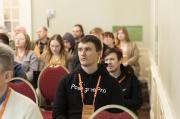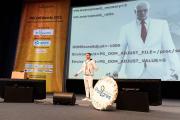31 March – 01 April 2025
PGConf.Russia 2025
PGConf.Russia is the largest PostgreSQL conference in Russia and the CIS. The event offers technical sessions, hands-on demos of new DBMS features, master classes, networking opportunities, and knowledge exchange with top PostgreSQL community experts. Each year, hundreds of professionals participate, including DBAs, database architects, developers, QA engineers, and IT managers.
Agenda highlights
-
Latest news and updates from the PostgreSQL global community
-
Monitoring, high availability, and security
-
Streamlined migration from Oracle, Microsoft SQL Server, and other systems
-
Query optimization
-
Scalability, sharding and partitioning
-
AI applications in DBMS
-
PostgreSQL compatibility with other software
Talks
Talks archive
-
 Павел Филин YADRO
Павел Филин YADROFor DBAs, ensuring database protection and integrity is always a top priority. Along with that comes the need to store data efficiently and compactly, without overloading the network, and ensuring reliable recovery.
In this talk, we’ll discuss a universal solution for backup and archive storage that not only offers effective deduplication but also minimizes network load. TATLIN.BACKUP is a platform for storing PostgreSQL backups or WAL archives with compression, deduplication, and minimal data transmission over the network.
TATLIN.BACKUP is a versatile solution for transferring and storing PostgreSQL archives at remote locations from a central office.
-
 Владимир Комаров
Владимир КомаровThere are many administrator consoles out there, ranging from the old-school DBeaver to the ubiquitous pgAdmin. However, we decided to create another one. Why?
In this talk, you’ll learn:
-
How can a single installation manage tens of thousands of database instances.
-
How many users can the console support.
-
How can you inventory your infrastructure without losing your sanity.
-
How do you integrate into an existing environment without starting from scratch.
-
How to build a security model that earns the trust of leading banks and telecom operators.
-
How can you get hands-on experience with all of this.
-
-
 Александр Степашкин PostgresPro
Александр Степашкин PostgresProA brief presentation on various extensions that can assist with optimization.
-
 Anton Doroshkevich Инфософт
Anton Doroshkevich ИнфософтThe issue of slow month-end closing and cost calculation on PostgreSQL has been a long-standing problem. In this talk, we will explore what modern versions of PostgreSQL offer in this regard and answer the question, "Do replicas slow down the master?"
We will also take a look at different types of physical replication and, for dessert, share a recipe for quick and painless month-end closing in 1C without affecting the daily operations of users.
Photos
Photo archive